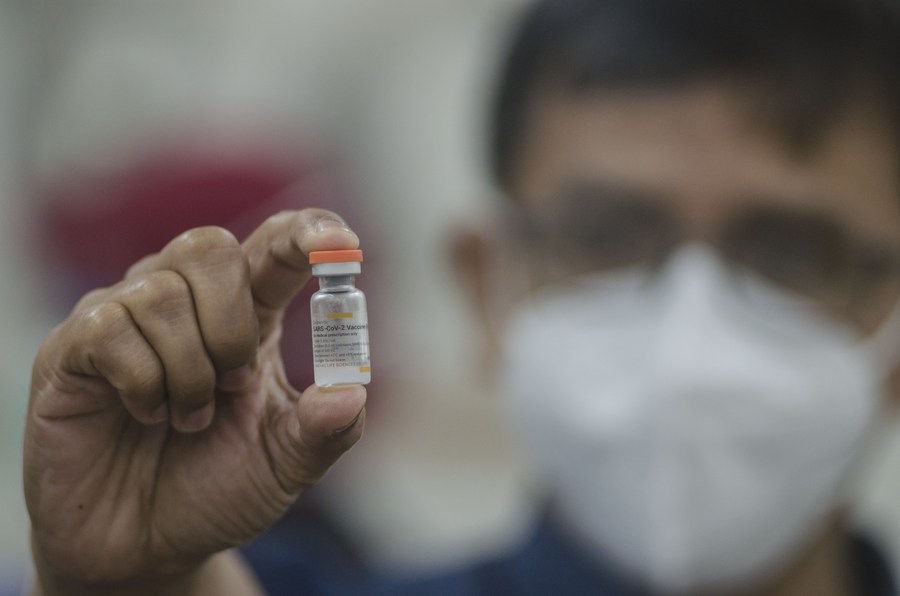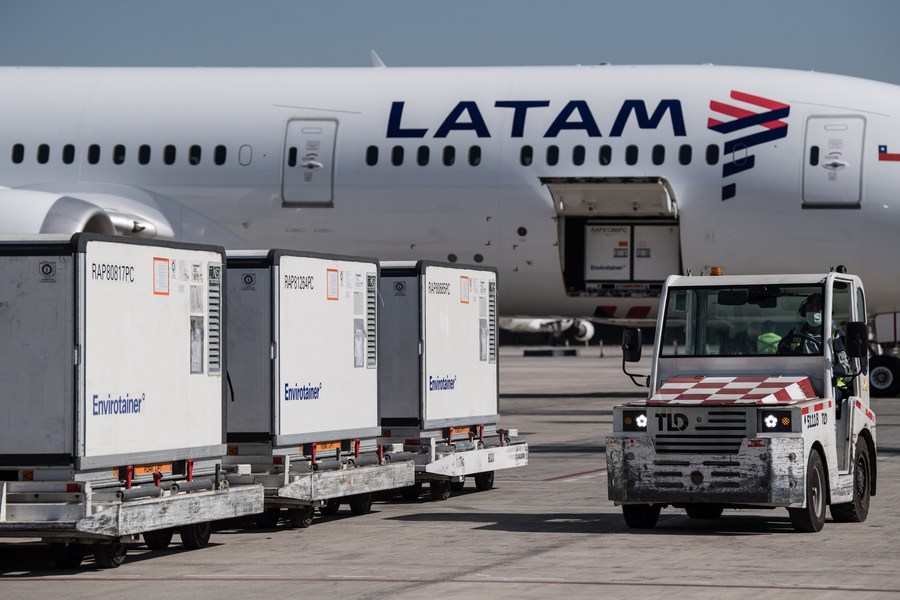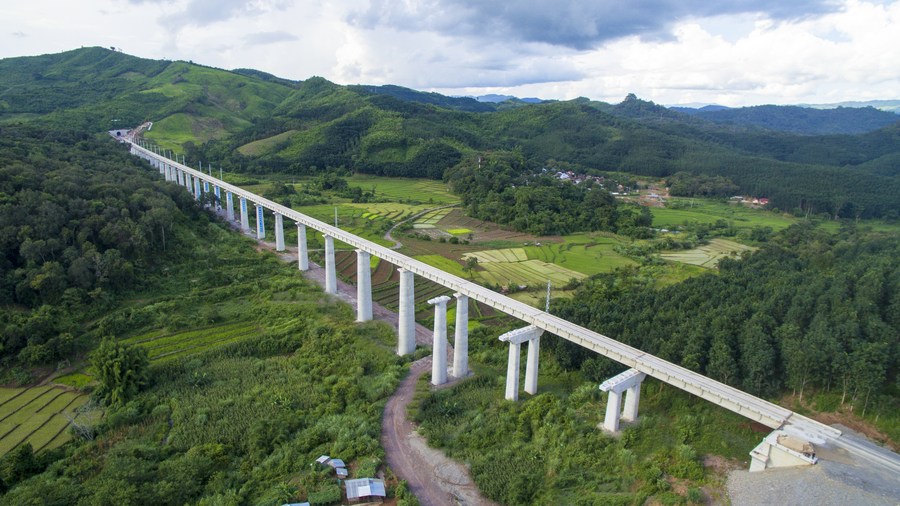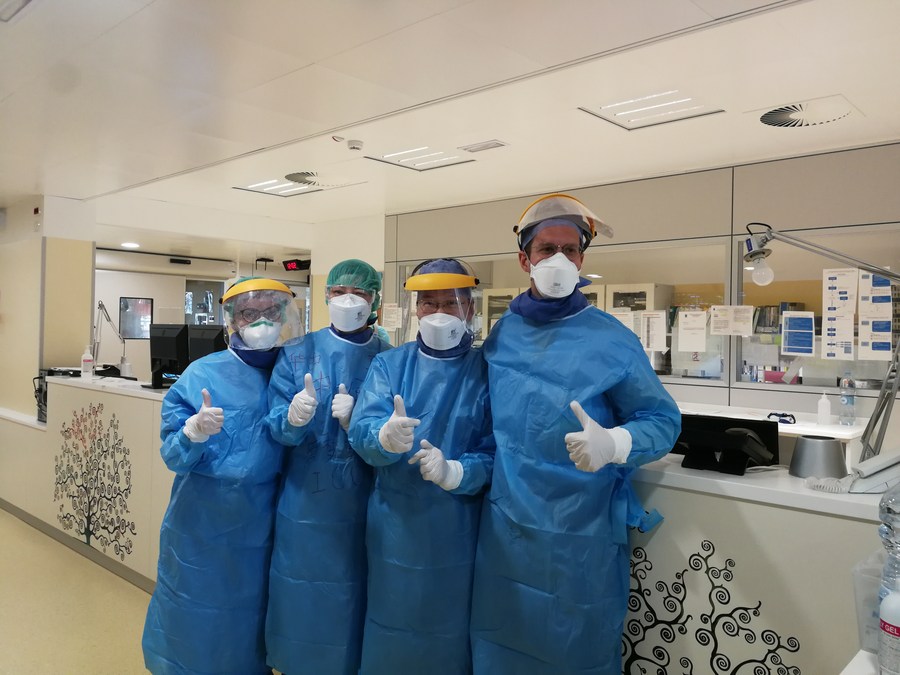A staff member shows a dose of China's Sinovac COVID-19 vaccine during vaccination program as second injection for health workers as the main priority group in Bandung, West Java, Indonesia, Jan. 28, 2021. (Photo by Septianjar/Xinhua) Chinese President Xi Jinping's pledges and proposals, ranging from promoting global vaccine cooperation and jointly building the Belt and Road, to practicing multilateralism, have charted the course for a world that has arrived at a historic crossroads. BEIJING, Feb. 1 (Xinhua) -- As the world heads into the second month of 2021, it is still struggling to handle a ravaging COVID-19 pandemic, a deep economic recession, as well as a turbulent and shifting global order. Against the backdrop of growing risks and uncertainties, Chinese President Xi Jinping has, on an array of bilateral and multilateral diplomatic occasions, offered China's solutions to those daunting challenges. His pledges and proposals, ranging from promoting global vaccine cooperation and jointly building the Belt and Road, to practicing multilateralism, have charted the course for a world that has arrived at a historic crossroads. A worker drives a vehicle to carry containers loaded with vaccines developed by Chinese firm Sinovac Biotech at Santiago international airport in Santiago, Chile, Jan. 28, 2021. (Photo by Jorge Villegas/Xinhua) PROMOTING VACCINE COOPERATION Global COVID-19 cases surpassed 100 million on Jan. 26, according to the Center for Systems Science and Engineering at Johns Hopkins University. Amid surging infections, a fair distribution of effective vaccines is believed to be the best way to guide the world out of the tunnel. Since the outbreak of the COVID-19 pandemic, Xi has been engaged in intensive "cloud diplomacy," including attending or chairing virtual meetings and having phone calls with foreign leaders and heads of international organizations, during which he repeatedly called for solidarity against the pandemic, as well as global cooperation on the research, development and distribution of COVID-19 vaccines. During his phone conversation with German Chancellor Angela Merkel in November 2020, Xi said China stands ready to strengthen exchanges and cooperation with Germany on COVID-19 vaccines and push for the vaccines to be fairly distributed as a global public good, especially for the benefit of developing countries. In a telephone conversation on Jan. 21 with Thongloun Sisoulith, general secretary of the Lao People's Revolutionary Party Central Committee, Xi said China will continue to support Laos' efforts to fight the pandemic, and stands ready to actively consider aiding Laos with a batch of COVID-19 vaccines. China is willing to strengthen cooperation with Bolivia on COVID-19 vaccines, Xi said Thursday in a phone conversation with his Bolivian counterpart, Luis Arce. Addressing the World Economic Forum (WEF) Virtual Event of the Davos Agenda on Jan. 25, Xi said that "China will continue to share its experience with other countries, do its best to assist countries and regions that are less prepared for the pandemic, and work for greater accessibility and affordability of COVID-19 vaccines in developing countries," adding he hopes those efforts "will contribute to an early and complete victory over the coronavirus throughout the world." "There is no doubt that humanity will prevail over the virus and emerge even stronger from this disaster," Xi said. Photo taken on July 29, 2020 shows the construction site of the China-Laos Railway in northern Laos.(Photo by Pan Longzhu/Xinhua) JOINTLY BUILDING BELT AND ROAD The global economic recession induced by the COVID-19 pandemic has turned out to be the severest ever since the end of the Second World War in 1945 -- all major economic sectors have been devastated simultaneously for the first time in history, global supply chains have been disrupted, and trade and investment remain weak. Still, China's proposals and commitments expounded by Xi in his Davos speech have injected fresh momentum into the flagging global economy. "China will continue to promote trade and investment liberalization and facilitation, help keep the global industrial and supply chains smooth and stable, and advance high-quality Belt and Road cooperation," he said. Belt and Road cooperation, a key term in Xi's phone calls with foreign leaders in January, has been warmly welcomed by the international community. Thongloun said in the telephone conversation with Xi on Jan. 21 that Laos will strengthen bilateral cooperation in such areas as building the Belt and Road, and promote friendly exchanges at all levels. Dominican Prime Minister Roosevelt Skerrit said in a telephone conversation with Xi on Jan. 25 that Dominica will actively participate in the joint construction of the Belt and Road to promote the continuous development of Dominica-China relations and the relations between Caribbean countries and China. Belarusian President Alexander Lukashenko said in a telephone conversation with Xi on Jan. 26 that his country is willing to join China in actively promoting bilateral Belt and Road cooperation and the construction of the Belarus-China industrial park, and strengthening cooperation in various fields such as economy, trade and exchanges at local levels. China's development is an opportunity for the world, Xi said in a keynote speech at the opening ceremony of the 47th WEF annual meeting in Davos four years ago. Now, in his latest Davos speech, Xi said that "as China enters a new development stage, we will follow a new development philosophy and foster a new development paradigm with domestic circulation as the mainstay and domestic and international circulations reinforcing each other." "China will work with other countries to build an open, inclusive, clean and beautiful world that enjoys lasting peace, universal security and common prosperity," Xi added. Indeed, with a new development paradigm, China will further deepen its reform and opening up, which will certainly provide more opportunities for global development and cooperation. Chinese medical team experts and Italian doctors pose for a photo during the COVID-19 pandemic in Padua, Italy, March 18, 2020. (Xinhua) PRACTICING MULTILATERALISM "The problems facing the world are intricate and complex. The way out of them is through upholding multilateralism and building a community with a shared future for mankind," Xi said in his latest Davos speech. In fact, the 25-minute special address was brimming with Xi's call for multilateralism, which has resonated internationally. Xi said that "multilateralism is about having international affairs addressed through consultation and the future of the world decided by everyone working together." "'Selective multilateralism' should not be our option," Xi said later in his speech, adding that "to uphold multilateralism in the 21st century, we should promote its fine tradition, take on new perspectives and look to the future." Besides, Xi has also elaborated in his speech on five initiatives China will take to practice multilateralism, by continuing to take an active part in global cooperation on COVID-19, implement a win-win strategy of opening up, promote sustainable development, advance science, technology and innovation, as well as promote a new type of international relations. "We believe that when the interests of the entire humanity are at stake, China must step forward, take action, and get the job done," Xi said, adding "let us all join hands and let multilateralism light our way toward a community with a shared future for mankind."



Chinese president's "cloud diplomacy" in new year
Editor:贺予菁
Source:Xinhua
Updated:2021-02-03 15:55:12
Source:Xinhua
Updated:2021-02-03 15:55:12
Special
Contact
Welcome to English Channel! Any suggestion, welcome.Tel:0731-82965627
lisl@rednet.cn
zhouqian@rednet.cn











